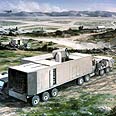
Israel to Abandon Nautilus?
Development of chemical laser cannon, which is supposed to intercept short-range rockets, stopped due to its astronomical cost, clumsy nature. American company already announces development of new and improved model; Israel may have to abandon project
WASHINGTON - During and following the war in the north, the question as to why Israel did not equip itself with innovative weaponry capable of intercepting Hizbullah rockets was raised many times.
Mentioned in the same breath was Nautilus, a chemical laser cannon, which intercepts short-range rockets. Nautilus was being developed by an American company and was to be used by Israel. It turned out, however, that the project never took off, and according to Israeli sources in the United States, Israel will soon have to abandon the project and look for another defense system.
Reasons for abandoning Nautilus stem mainly from the fact that the chemical laser cannon is just not worth the investment. Sources say that in order to protect the Galilee from Katyusha rockets and the southern communities from Qassam rockets, Israel will have to spread dozens of batteries for these cannons, which will cost billions of dollars.
The advantage of the cannon is that it has proven effective in successfully intercepting Katyusha and other types of rockets, as well as mortar shells. The cannon could be operational within two years; however, security sources say it is a monstrous product with many limitations.
Firstly, its interceptive capabilities depend largely on weather conditions. Secondly, it can only fire once every few seconds, which means that Nautilus wouldn't be effective against fast rockets. And its biggest disadvantage is that each cannon can only protect 2 kilometers (1.242 miles) of land, which means that it would take 40-50 cannons in order to protect the Galilee and the southern communities at a cost of USD 2-3 billion.
The dilemma as to whether or not Israel should use Nautilus is strengthened due to the fact that an American company, Northrop Grumman, has announced that it has assembled an improved version of the cannon, and is currently awaiting Pentagon approval so that it may present its product to the Israeli defense estbalishment.
Northrop Grumman claims that the new laser cannon is activated by an electric generator, and is free of many of the Nautilus' limitations. Even so, Israeli sources are skeptical as to the company's ability to make major changes to the cannon. More importantly, the chemical laser is almost ready for operational use, while the new version is a few years behind, and Israel can't afford to wait.
Real problem still Iran
Even if Israel eventually decides to invest in the manufacturing of the Nautilus, security sources explain that Israel's main objective is to defend its skies of the threat of ballistic missiles, and not of short-range rockets.
In order to deal with the nuclear threat, originating mainly from Iran, Israel is forced to seek other solutions. The Israeli security system is currently working on trying to thicken aerial defense with defense missiles other than the American Patriot and Arrow. Israel is also working on finding a solution for missile defense for up to 200 kilometers (124.27 miles).
The US Senate recently approved a USD 25 million grant to be transferred to Israel to develop missiles that can defend against SRBM missiles. The House of Representatives has not yet given their final approval of the transfer, the sum however does appear on the 2007 American Budget. With an annual budget of 25 million dollars, the project would take six years.










